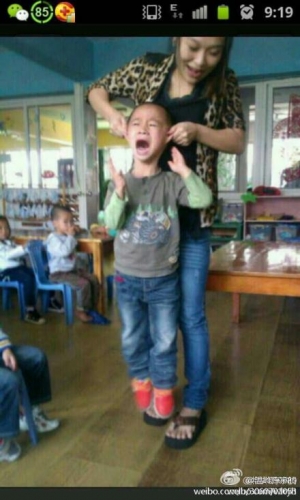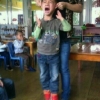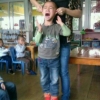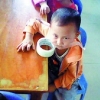News » Society » Bo Xilai's post as national legislator terminated
News » Society » Bo Xilai's post as national legislator terminated |
- Bo Xilai's post as national legislator terminated
- China launches another satellite for independent navigation system
- China parliament expels Bo Xilai
- Cash for tips to snuff out human fireballs
- Police are offering up to 200,000 yuan (HK$248,000) as a reward for information on the "black hands" behind a string of self-immolations in a Tibetan-inhabited region.
- Ningbo to `listen' in plant protest
- Where are the powerful Chinese women?
- Teacher Yan Yanhong lifted a boy off the ground by his ears (photos and interview)
- Preschoolers mistreated 'for fun,' teachers detained
- Strangers help man, 102, eking out living
- Safeguarding sovereignty
- Fake classy liquors targeted
- Late writer's birthplace plans ambitious project
- Proposed law will protect the mentally ill
- Hackers attempt to take advantage of 'Mo-mania'
- China outcry over school abuse
- S&P warns of risk for China’s banking sector
- AVIC partners with GE to grab a slice of China’s civil aviation
- Bank of China 17% Profit Jump Tops Estimates on Margins
- Japan, China Diplomats Meet Amid Territorial Dispute
| Bo Xilai's post as national legislator terminated Posted: 25 Oct 2012 07:39 PM PDT THE Standing Committee of the 11th National People's Congress (NPC) today announced the termination of Bo Xilai's post as the NPC deputy. The Standing Committee of Chongqing Municipal People's Congress removed Bo from his post as the NPC deputy late last month. According to the law on deputies to NPC and to local people's congresses, his post was terminated, said a statement from the NPC Standing Committee, the top legislature, at its bimonthly session. |
| China launches another satellite for independent navigation system Posted: 25 Oct 2012 06:08 PM PDT CHINA successfully launched another satellite into space for its indigenous global navigation and positioning network at 11:33 pm yesterday, the launch center said. The satellite, launched from the Xichang Satellite Launch Center in the southwestern province of Sichuan, was boosted by a Long March-3C carrier rocket. It was the 16th satellite for the Beidou system, or Compass system. The network is planned to officially provide services for most parts of the Asia-Pacific region in early 2013 and begin offering global services by 2020. Since it started to provide services on a trial basis on December 27, 2011, the Beidou system has been stable, said a spokesperson of the China Satellite Navigation Office. The system has been gradually used in extended sectors including transportation, weather forecasting, marine fisheries, forestry, telecommunications, hydrological monitoring and mapping, according to the spokesperson. The newly-launched satellite will play an important role in improving the system's service, the spokesperson said. China started to build up its own satellite navigation system to break its dependence on the US Global Positioning System in 2000. Between October 2000 and May 2003, the country set up a regional satellite navigation system after launching three Beidou geostationary satellites. Beidou-1 can not meet growing demand, so China decided to set up a more functional Beidou-2 regional and global navigation system, Qi Faren, former chief designer for Shenzhou spaceships, said in an interview in 2011. The Beidou-2 system will eventually consist of 35 satellites. Five Beidou satellites were sent into space early this year. The 11th satellite was boosted by a Long March-3C carrier rocket on Feburary25, the 12th and 13th were sent by a Long March-3B carrier on April 30, while the 14th and 15th satellites were launched on September 19. This posting includes an audio/video/photo media file: Download Now |
| China parliament expels Bo Xilai Posted: 25 Oct 2012 07:59 PM PDT China's top legislature formally expels disgraced lawmaker Bo Xilai, stripping his immunity from prosecution, state media says. |
| Cash for tips to snuff out human fireballs Posted: 25 Oct 2012 07:05 PM PDT Ad: Auto Mass Traffic Generation Software - Traffic Generation Software Pulls More Instant Traffic Than Internet Giants Google, Yahoo, And Msn Combined!! *75% Commissions* Excellent Stick Rate With Low Refunds. Up To $847/lead, $6 Epc. $16,000 Cash Prizes. Http://automasstraffic.com/affiliates.html |
| Posted: 25 Oct 2012 07:05 PM PDT Ad: Auto Mass Traffic Generation Software - Traffic Generation Software Pulls More Instant Traffic Than Internet Giants Google, Yahoo, And Msn Combined!! *75% Commissions* Excellent Stick Rate With Low Refunds. Up To $847/lead, $6 Epc. $16,000 Cash Prizes. Http://automasstraffic.com/affiliates.html |
| Ningbo to `listen' in plant protest Posted: 25 Oct 2012 07:05 PM PDT Ad: Millionaire Society - Already Paid $7,042,774.72 To Affiliates! - Lowest Refunds In The Market Because Customers Love This Product! Long Term Money Maker. Monthly Recurring With Upsells! Bump Your Commission To 100% Inside Our Affiliate Command Center! Go To www.millionairesociety.com/affiliate |
| Where are the powerful Chinese women? Posted: 25 Oct 2012 05:34 PM PDT As China prepares to unveil new leaders, where are all the women? |
| Teacher Yan Yanhong lifted a boy off the ground by his ears (photos and interview) Posted: 25 Oct 2012 01:29 PM PDT YAN Yanhong is the teacher seen on Weibo, the Chinese twitter, holding a pupil off the ground by his ears. Parents of pupils at the Wenling school are unimpressed. You can also see photos of Yanhong's pupils wearing metal bins on their heads, having their mouths taped shut and hands stuck to a desk. Yanhong says the youngsters, some aged 6, "were just having fun". A quick check on Yanhong revealed that she had no formal teaching qualifications. Offbeat China has seen an interview with Yanhjong. The journalist says 20-year-old Yan is in police custody:
Wackford Squeers is away… Spotter: EpochTimes; photos: OffbeatChina |
| Preschoolers mistreated 'for fun,' teachers detained Posted: 25 Oct 2012 10:25 AM PDT POLICE detained two female teachers at a kindergarten in east China's Zhejiang Province yesterday for allegedly abusing students "for fun" and then posting online pictures of the abusive acts. Yan Yanhong, 20, an unlicensed teacher, was seen in a picture smiling beside a crying boy she allegedly had lifted up nearly 20 centimeters by the ears. Other pictures posted to the Internet showed children, aged between four and five, with their mouths sealed by tape, dumped head-first in a trash can, with their clothes stripped off as they danced and made to kiss each other. There were no reports of injuries. Yan allegedly wrote "It's fine!" beside the Internet pictures. In interviews with local media, Yan said. "I just played with them at that time" and "It was great fun. The picture was so interesting!" Yan and another teacher, Tong Qingqing, who took pictures instead of stopping the abuse, were dismissed by the privately run Blue Peacock Kindergarten in Wenling City as soon as the scandal made headlines on Wednesday. "Yan asked me to take pictures and I did. I didn't expect that these pictures would pose such great social influence," Tong said in a TV interview. Local education authorities have also ordered teachers of the kindergarten to apologize to every family of students in the class in which the incident took place. Yan was detained "on charges of picking quarrels and provoking troubles," according to a statement from the Wenling city government. The maximum penalty for that charge is five years in prison. Yan was accused of stirring up troubles because China's child-abuse laws only apply to family members, leaving a loophole, police said. Current laws regarding the protection of minors rely on school administrators and education authorities to punish teachers. However, these laws are not always strongly enforced. It said Tong, who took the pictures and uploaded them, has been put under a seven-day administrative detention. "She has problems in her moral quality," Wu Guojian, a local official, said of Yan. The kindergarten had failed to pass this year's educational evaluation, he added. The kindergarten was ordered to rectify its practices. "Whether it will be closed down depends on how the rectification goes," the government's statement said. Administrators of the kindergarten said they just heard about the case and couldn't provide any other details, Taizhou TV reported. Two other cases of abuse of young children by teachers have come to light this week. In Shanxi's provincial capital of Taiyuan, a five-year-old girl got dozens of slaps on the face within 10 minutes just because she couldn't add up 10 and one, media reports said. The teacher has been put under a 15-day detention, the preschool was ordered to shut down, and the 40-plus children were sent to other schools. The incidence has triggered an overhaul of preschools in Taiyuan. A four-year-old boy in Shanxi's neighboring province of Shaanxi was cut on the wrist with a saw as punishment for not performing well when exercising. Teachers in such cases usually get sacked, but the most severe punishment generally has been a 15-day administrative detention, according to media reports. Internet users said abuse won't be deterred by such light penalties. "It would leave scars not only in the victims' hearts but also in other children," microblogger Chen Yuhang wrote. He also blamed education authorities for not supervising teachers and kindergartens well. These scandals expose a lack of supervision and public investment in preschool education. Government investment in preschool education accounts for just 1.2 percent of its total education expenditures, far less than the average of 6 to 8 percent in developed countries, according to Xinhua news agency. Kindergartens are not part of China's nine-year compulsory eduction system, which enjoys strong government funding. A shortage of public kindergartens has led to the proliferation of private schools, which often lack the supervision implemented in public schools. Cost-cutting and financial pressures lead many private kindergartens to pay their teachers less than their public counterparts. An education official in Wenling said private kindergarten teachers earn about 20,000 yuan (US$3,172) annually, just one-third of the average salary for public teachers. |
| Strangers help man, 102, eking out living Posted: 25 Oct 2012 10:23 AM PDT AT 102 years of age, Wang Zhenrong struggles to eke out a living selling shoe insoles on a Beijing street late into the night, gulping down a single cold bun for dinner and refraining from taking breaks for the bathroom or drinking water. His story sparked widespread sympathy after it was posted on the Internet on Tuesday. People came in droves to buy insoles. For the first time in five years, Wang's insoles were sold out and he was able to go home early on Wednesday. The widower, born in 1910, sews removable insoles during the day and sells them in the evening. Wang has three children, all retirees who are either unable or reluctant to care for him. His most frequent customers are sympathetic students from two nearby universities, who often buy more insoles than they actually need, bring him hot meals and help him at his "stall," an old baby carriage that also is his only means of transportation. Wang's story has led many to consider the plight of elderly Chinese who have no one to take care of them. A 78-year-old woman from Henan Province in central China has been in the spotlight peddling her own paintings on the streets of the southern boom city of Shenzhen. The old woman lives with her husband in a hut in Shenzhen, saying they are too poor to survive in their hometown. As 14 percent of Chinese are aged 60 or above, inadequate care for the elderly people has proven to be a serious problem. China had 190 million people at or above the age of 60 at the end of last year. By 2050, one-third of Chinese will be over 60 years of age. |
| Posted: 25 Oct 2012 10:23 AM PDT Chinese marine surveillance ship Haijian No.75 cruises in waters northwest of one of the Diaoyu Islands in the East China Sea yesterday. Foreign Ministry spokesman Hong Lei confirmed that Chinese maritime surveillance ships conducted routine patrols in the territorial waters around China's Diaoyu Islands to safeguard the country's sovereignty. Also yesterday, China voiced stern opposition to Japan's joint military exercise operations with "extraterritorial nations," regarding a potential Japan-US joint military exercise in Okinawa. This posting includes an audio/video/photo media file: Download Now |
| Posted: 25 Oct 2012 10:21 AM PDT AUTHORITIES are cracking down on the manufacture and sale of counterfeit tegong liquor, a type of high-priced booze that is traditionally supplied to government organizations and other privileged groups. The liquor, designated by a special logo affixed to the bottle, is sold at discounted prices on Taobao.com, the country's biggest e-commerce site, as well as regular liquor stores. However, steep discounts have only been made possible through counterfeiting and other illicit practices, even extending to Moutai and Wuliangye, two of China's most well-known and most expensive liquor brands. A Xinhua investigation indicated that a profiteering industrial chain is behind the phenomenon. Xinhua reporters visited the office of a liquor distillery in the town of Maotai in Guizhou Province, also known as the original home of Moutai, a leading liquor brand in the nation. The office housed a large variety of liquors, with many featuring tegong logos. Tegong means special supply. "We can work out any liquor packages per your demands," said an office employee surnamed Yi. "We have more than 1,000 types of bottles and labels and you can choose whatever you like," he added. Yi ushered the reporters into a room where about 100 liquor bottles with various tegong logos were on display. Yi said one of the distillery's 50 yuan (US$8) bottles would normally be priced around 200 yuan. "You cannot buy such custom-made liquor products anywhere else on the market," he said. The flood of tegong commodities on the market demonstrates poor consumption habits, as many Chinese mistakenly believe that the commodities with such labels are of higher quality, said Sun Yuanming, a researcher at the Chongqing Municipal Academy of Social Sciences. China bans the use of names of military or government institutions for the commercial promotion of commodities, as is the case with the counterfeit liquor. However, there are no specific laws in place to punish manufacturers, said Peng Yong, an official from the Guizhou's Administration for Industry and Commerce. The State Administration for Industry and Commerce recently joined hands with several ministries and organizations to work out a plan to eliminate fake tegong commodities. The SAIC said the overhaul will mainly focus on e-commerce websites that sell the products. |
| Late writer's birthplace plans ambitious project Posted: 25 Oct 2012 09:22 AM PDT EMINENT writer and scholar Lin Yutang's birthplace, Banzai, a mountainous town in Fujian Province, plans to spend about 3 billion yuan (US$481 million) building a "world literature town" to boost tourism. Cai Xiaoyong, a Banzai Party official, said they started the project to match the late Lin's prominent literary status. The local government attracted 1 billion yuan (US$160 million) of investment two years ago as part of its "Lin-themed" cultural project. A park to show Lin's childhood and to mark his popular novel "A Leaf in the Storm," dubbed a Chinese version of "Gone with the Wind," has been completed. But people argued the government and developer have failed to show Lin proper respect as they just want to make money off of his name. Critics also feared the ambitious blueprint would be halted due to its high costs, Strait Herald, a Fujian-based newspaper, reported yesterday. Yikun Investment Company, which is funding the project, said 3 billion yuan was just an estimate and that actual investment may be more. "We wouldn't do it if we didn't forecast handsome returns," said Guo Huiling, a manager at the company. Cai also ensured the public that Yikun is a trustworthy company and the government will keep a close eye on the development, the paper said. Lin was born in 1895 and died in 1976. He was one of the most influential writers of his generation. |
| Proposed law will protect the mentally ill Posted: 25 Oct 2012 09:22 AM PDT CHINA is mulling a long-awaited law for mental health, which is expected to better protect people's rights by prohibiting abuses of compulsory inpatient treatment. The draft law was presented on Tuesday for a third reading at a four-day bimonthly session of the Standing Committee of the National People's Congress, China's top legislature. It includes provisions on ensuring the safety of property belonging to patients with mental disorders, and more importantly, it is expected to eliminate abuses regarding compulsory mental health treatment and protect citizens from undergoing unnecessary treatment or illegal hospitalization. The treatment of mental illness involves dignity and freedom, the basic rights of people, as it often takes extreme measures and restricts personal freedom. Mental illness can also undermine the reputation of the people concerned. In his report to the top legislature in October 2011, China's health minister, Chen Zhu, admitted the lack of protocols for compulsory treatment of mentally ill people was one of the major problems in mental health services. Due to the absence of laws and procedures, some healthy people have been treated with unnecessary therapies for a nonexistent mental illness. Compulsory treatment has sometimes been used as a tool for people who have conflicts with their relatives, or even someone in power. In addition, there are no limits placed on the number of patients mental hospitals can receive. Thus they can easily make profits by diagnosing a mental illness that doesn't exist and making money off treatments. A well-known case from 2010 in Shandong Province saw a healthy man take a mental hospital and his wife to court. After having marriage problems his wife tried to have him admitted to the mental hospital for compulsory treatment. The court ordered the hospital to pay the man 5,000 yuan (US$791) as compensation for "violating the citizen's personal freedom." Similar situations can be avoided if the draft law is passed by the top legislature. The draft stipulates every mental illness diagnosis should be made by a qualified psychiatrist. Patients can decide to undergo treatment or not, and only those who are diagnosed with a severe mental illness and have the potential to harm themselves and others should be sent for compulsory inpatient treatment, the draft states. |
| Hackers attempt to take advantage of 'Mo-mania' Posted: 25 Oct 2012 09:21 AM PDT THIS year's Nobel Literature Prize winner Mo Yan probably never expected "Mo-mania" would offer hackers the chance to harm others' computers or steal people's personal information. Since winning the Nobel, Mo's books have sold out so fast both online and in bookstores that many readers have to wait for the books to be reprinted. Those who don't have the patience to wait have turned to online downloads, many of which are unauthorized and expose people to possible cybercrimes. Hackers are increasingly targeting these websites and links in an attempt to spread viruses or lure netizens to disclose their personal details, police from several cities and provinces, including Shanghai, have said. Police have found more than 2 million online links that claim to provide free downloads of Mo's books. They expect the figure to keep rising. Police warned netizens to be aware of hacker attacks. To express his appreciation to Shanghai, Mo has sent some of his manuscripts to the city and they are among several being displayed in Putuo District Library as part of a Nobel Prize works exhibition, which opened yesterday. Manuscripts of Mo's novels like "Frog" and "Big Breasts & Wide Hips" are on display. The library also has an unpublished version of "Frog" on display. Mo had once sent it to a Shanghai commentator to ask for advice. His manuscripts will be a permanent display. With Mo becoming a national sensation, his books have become bestsellers in book stores around the country. "Aunt's Treasured Sword" is being reprinted after hitting stores in August. |
| China outcry over school abuse Posted: 25 Oct 2012 11:21 AM PDT Chinese police detain several teachers following a public outcry over pictures circulated online showing teachers being violent to pupils. |
| S&P warns of risk for China’s banking sector Posted: 25 Oct 2012 09:41 AM PDT Source: By Wei Tian (China Daily) China's banking system will have its resilience tested over the next three to five years as operating conditions turn harsher, which in turn may trigger a massive industry consolidation, Standard & Poor's Ratings Services said on Wednesday. Smaller banks, which are aggressive but unprepared, will be hardest hit by the worsening conditions, resulting in a growing gap between the strongest and weakest banks in China. S&P said that the larger and stronger banks will see a good opportunity to snap up smaller and weaker players to strengthen their market positions. "More and more small banks will choose to build alliances," said Liao Qiang, director of Financial Institutions Ratings at S&P. "We are not expecting mergers right now. But if the credit downturn unfolds, the pressure may lead to mergers." Chen Daofu, policy research chief of the Financial Research Institute at the State Council Development Research Center, said: "The credit scale has expanded rapidly in the past few years, but now its growth is thwarted and there is a rise in the number of non-performing loans." "The market-oriented interest rate reform also puts a lot of pressure on banks," he added. The slowdown of China's economic growth not only affects the country's banking industry, but also casts a shadow on top companies. Although the sovereign credit rating for China remains strong, the credit profile of the leading companies is lagging, S&P said. "The operating performance of these companies is a shining point. But the level of liabilities is relatively high, resulting in high financial risks," said Fu Bei, director of Corporate Ratings in Asia Pacific at S&P. S&P concluded that the companies in the telecommunications, and oil and gas sectors rank the best in credit strength, with strong positions and minimal financial risks. "The oil and gas sector enjoys structural advantages and increasing demand. The monopolistic status of the three big oil and gas companies will not be changed easily, and the government also has considerations for national energy security," said Lawrence Lu, director of Corporate Ratings in Asia Pacific at S&P. By contrast, companies in the field of construction, engineering, coal and infrastructure are more aggressive and face higher risks. The iron and steel industry and the aluminum industry also face great challenges. Overcapacity remains severe, and many products concentrate on the low end. Lu said he expects the industry to be a low-profit one for a long time. Chen at the State Council's Development Research Center, said: "It is important to encourage innovation and to drive the process of transformation. Companies need to further reduce costs, and there might be necessary integrations and restructuring in each sector." S&P's study looked at 107 Chinese major companies across 15 industry sectors, among which about 80 percent were State-owned entities. The study assessed the stand-alone credit profile of these companies. |
| AVIC partners with GE to grab a slice of China’s civil aviation Posted: 25 Oct 2012 09:38 AM PDT Source: Want China Times The Aviation Industry Corporation of China on Oct. 20 teamed up with General Electric to create a joint venture — GE AVIC Civil Avionics Systems Company. The joint venture will offer technology and solutions for civil aircraft. GE, for the first time, has formed a partnership with a Chinese company to develop core technology in the field of aviation, integrating its avionic business into the joint venture, while other foreign avionic companies are unwilling to form joint ventures with Chinese partners out of concern for technology leaks. Both sides promised to invest part of their avionic R&D, manufacturing, marketing and after-sales services in the partnership. GE, in particular, integrated its integrated modular avionics, used in civil airplanes and their management process, into the joint venture. The two companies had started securing orders for core avionics, displays and other related systems for developing the domestic model C919 before the partnership started. The C919 will be developed by the Commercial Aircraft Corporation of China, which expects to deliver around 2,300 of the jetliners over the next 20 years. The project will provide the US$2 billion in business to the joint venture, said AVIC sources. CFM International, a 50-50 joint-owned company of France-based SNECMA and GE, has been designated as the engine provider for the C919. GE will become the largest engine and avionic systems provider for the aircraft while the two parts account for 40% of the total value of the plane. |
| Bank of China 17% Profit Jump Tops Estimates on Margins Posted: 25 Oct 2012 09:44 AM PDT Source: Bloomberg News Bank of China Ltd., the nation's fourth-largest lender by assets, posted a better-than-estimated 17 percent increase in third-quarter profit as its lending margin improved. Profit growth accelerated to the fastest pace in more than a year as China's largest banks resisted pressure from the government to offer discounts on loans, protecting their margins after the central bank widened the band for lending rates. Bank of China may struggle to maintain earnings momentum as a continued slowdown pushes borrowers to default. "Bank of China suffers the least from interest rate cuts and interest rate deregulation because it has the largest overseas exposure," said Timothy Li, an analyst at Core Pacific-Yamaichi International Hong Kong Ltd. "We still see deterioration in asset quality" in the industry. Bank of China's net interest margin in the first nine months was 2.12 percent, an increase of 0.02 percentage points from the end of June, according to the statement. Shares (3988) of Bank of China rose 1 percent yesterday in Hong Kong before the earnings were published, extending their gain this year to 10 percent. That trails an 18 percent advance in the benchmark Hang Seng Index (HSI) this year. Interest Income Net interest income grew 15 percent to 65.4 billion yuan in the third quarter, while net fee and commission income, from products such as credit cards, fell 1 percent to 15.7 billion yuan, the bank said in yesterday's statement. Overseas operations accounted for about 24 percent of Bank of China's total assets at the end of June, the most among China's four largest banks. The People's Bank of China and the China Banking Regulatory Commission aim to avoid a repeat of the two-year, 17.6 trillion- yuan credit boom that propelled economic growth in the country following the 2008 financial crisis. That spending binge fueled inflation and led to three straight quarters of growth in soured loans by the end of June this year, the longest streak of deterioration in eight years. China's new lending last month missed analysts' estimates as Chinese banks sought to avoid accumulating bad loans. Banks advanced 623.2 billion yuan of local-currency credit, the central bank said Oct. 13. That missed the median estimate of 700 billion yuan in a Bloomberg News survey. Loans Drop Bank of China extended 575.6 billion yuan of new loans in the first nine months, less than the 587.7 billion yuan offered during the same period a year earlier. Non-performing loans rose to 64.1 billion yuan as of Sept. 30 from 63.6 billion yuan in June, while the ratio dropped to 0.93 percent from 0.94 percent during the last three months. "Bank of China's third-quarter result is a high-quality beat, and the core of it is a better margin and asset quality than we had expected," said Sophie Jiang, a Hong Kong-based analyst at Religare Capital Markets. "It's too early to draw the conclusion that the whole sector will beat estimates. There's a delay before bad loans fully reflect the economic slowdown." China's four biggest lenders, all state-controlled, are limiting discounts for their best corporate clients to 10 percent of the benchmark lending rate, bank officials who asked not to be identified said this month. Agricultural Bank of China Ltd., the third-largest, is scheduled to report earnings after the Hong Kong stock exchange closes today. Rate Liberalization The central bank in June allowed lenders to widen the discount on borrowing costs to 20 percent, and then broadened the limit to 30 percent the following month, accelerating the liberalization of interest rates. The banks were permitted to offer deposit rates at 10 percent above the benchmark, the first time a premium has been allowed. Moves to deregulate interest rates may shrink Chinese banks' net interest margins, a measure of lending profitability, by four to six basis points this year, Moody's Investors Service said. That would reduce profits this year by 28.5 billion yuan, or 3 percent of last year's figure, the ratings company said on Oct. 16. |
| Japan, China Diplomats Meet Amid Territorial Dispute Posted: 25 Oct 2012 09:48 AM PDT Source: Wall Street Journal By Yuka Hayashi TOKYO—The Japanese and Chinese governments are intensifying back-channel efforts to mend their tattered bilateral ties, after weeks of public bickering surrounding disputed islands. The meeting between the No. 2 foreign ministry officials took place in Shanghai over the weekend, the official said. That followed a meeting between two diplomats one rung down on Oct. 11 in Tokyo. "Japan and China have been exchanging views over the current situation in regard to the Senkaku Islands on various levels. (The talks) were part of such moves," Osamu Fujimura, the Japanese government's chief spokesman, said at a press conference. China's foreign ministry spokesman, Hong Lei, declined to comment on the talks at his daily briefing. But China continues to send boats into the area, suggesting that the diplomatic exchanges aren't a sign that the tensions, which intensified in early September after the Japanese government bought the islands from private owners, have subsided. Five Chinese official vessels were spotted in areas just outside of territorial waters around the disputed islands Wednesday, according to the Japanese coast guard. Last week, China held a huge naval exercise in the East China Sea, displaying its military muscle with 11 vessels. Still, signs have emerged lately that the two sides may be moving to calm matters. The subtle shift is emerging amid growing concerns that the dispute has begun to hurt bilateral business ties and set off alarm among officials around the world that the spat between the two Asian economic giants might jeopardize global growth and destabilize the security of the entire region. Prominent Asia experts in the U.S.—both in and out of government—have in recent days made a point of trying to broker some kind of thaw between America's largest ally in the region and Asia's largest, fastest-growing power. A bipartisan group of four former U.S. national security officials, including James Steinberg and Richard Armitage, both former deputy secretaries of state, visited Prime Minister Yoshihiko Noda earlier this week to discuss the territorial issues, before flying to Beijing to meet Chinese officials, including State Councilor Dai Bingguo. Even during the height of the tiff, the two nations have held some key meetings, including one between the foreign ministers, Koichiro Gemba and Yang Jiechi, in New York on the sidelines of the United Nations General Assembly on Sept. 26. Also in late September, senior trade officials from Japan, China and South Korea met in Seoul, as scheduled, to discuss plans to launch a trilateral free trade agreement. But the Chinese government has regularly made a show of cancelling the most important planned appearances, prominently scuttling visits by its central bank chief and finance minister earlier this month to the annual meetings of the International Monetary Fund, which were held this year in Japan. After facing global criticism—including a public jab from IMF Managing Director Christine Lagarde—for its behavior, China may now be more willing to explore a way to dial down the noise. Following the cancellations of the high-profile appearances as well as numerous cultural and business exchanges, a few minor bilateral events have occurred as scheduled in recent weeks, generating glimmers of hope among Japanese officials. An exhibition of post-disaster Japanese architectural projects started in Hong Kong last week with the sponsorship of the government-funded Japan Foundation. A trilateral symposium on environmental education between Japan, China and South Korea is being held this week in Sendai in northern Japan, with the participation of government and private-sector officials. Of the four Chinese delegates on the list, two showed up in Sendai while the other two canceled, allowing the event to take place as scheduled. "It's not a perfect score but it's a passing grade," said an official for Japan's Ministry of Environment. In the talks held earlier this week, Japan's Vice Foreign Minister Chikao Kawai met with his Chinese counterpart in Shanghai as part of bilateral consultations that Tokyo and Beijing have maintained, Mr. Fujimura said at the press conference. He declined to provide further details of the meeting, including the name of the Chinese official who met with Mr. Kawai, the top bureaucrat of Japan's foreign ministry. One big question is if or when the leaders of the two countries will meet. Japanese officials have said they hoped they could stick with plans to initiate the Free Trade Agreement in November with China and South Korea, when leaders of the three nations are scheduled to meet at a regional summit in Cambodia. It's unclear, however, if China will send a top official to the event so soon after the country's planned leadership transition scheduled for early November. |
| You are subscribed to email updates from Update » News » Society To stop receiving these emails, you may unsubscribe now. | Email delivery powered by Google |
| Google Inc., 20 West Kinzie, Chicago IL USA 60610 | |













Comments